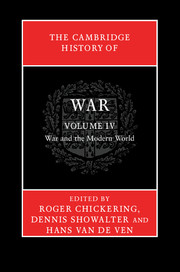Book contents
- Frontmatter
- Contents
- Illustrations
- Maps
- Notes on contributors
- Introduction to volume IV
- Part I The industrialization of warfare, 1850–1914
- 1 A hinge in time
- 2 War, technology, and industrial change, 1850–1914
- 3 War and imperial expansion
- 4 The non-western world responds to imperialism, 1850–1914
- 5 War, society, and culture, 1850–1914
- 6 War-making and restraint by law
- 7 The arms race
- Part II The Era of Total War, 1914–1945
- Part III Post-total warfare, 1945–2005
- Select bibliography
- Index
- References
5 - War, society, and culture, 1850–1914
the rise of militarism
from Part I - The industrialization of warfare, 1850–1914
Published online by Cambridge University Press: 05 December 2012
- Frontmatter
- Contents
- Illustrations
- Maps
- Notes on contributors
- Introduction to volume IV
- Part I The industrialization of warfare, 1850–1914
- 1 A hinge in time
- 2 War, technology, and industrial change, 1850–1914
- 3 War and imperial expansion
- 4 The non-western world responds to imperialism, 1850–1914
- 5 War, society, and culture, 1850–1914
- 6 War-making and restraint by law
- 7 The arms race
- Part II The Era of Total War, 1914–1945
- Part III Post-total warfare, 1945–2005
- Select bibliography
- Index
- References
Summary
The word “militarism” entered general usage in the 1860s. It initially carried several meanings, but the context was clear. At issue was the political and social place of armies and military values. The discussions of this issue were particularly intense in central Europe, where parliamentary struggles over the army in Prussia were the prelude to a series of wars that resulted in German national unification in 1871. The epithet “militarism” was hurled in the first place by south German democrats, Catholics, and other opponents of Prussian policies that eventually triumphed in the Franco-Prussian War. Across the Rhine, the same term was invoked meanwhile to criticize the emperor, Napoleon III, whose policies were said to invoke the specter of military conflict abroad in order to promote stability at home. The term has spawned controversy ever since. Its most common connotations have been pathological. On the one hand, they have focused on civil–military relations, on the failure of civilian control and the resulting intrusion of soldiers into policymaking institutions. Another common set of connotations has addressed broader questions of political culture – the pervasiveness of military patterns of thinking and behavior in civil society. Lawrence Radway, who wrote the original entry on “militarism” in the International Encyclopedia of the Social Sciences in 1929, captured both the institutional and cultural facets of the phenomenon when he defined militarism as a doctrine that “values war and accords primacy in state and society to the armed forces.”
The remarks that follow are not going to resolve the controversy. Mindful of the etymology of the word, they will argue that “militarism” best describes far-reaching cultural transformations that began after 1850 – first in continental Europe – to redefine the relationship between armed forces and society, even as both these concepts themselves underwent redefinition. In a narrower institutional sense, “militarism” does not do justice to these great transformations. Whether their names were Caesar, Tamerlane, Wallenstein, or Napoleon, warlords had long been potent forces in political councils around the world.
- Type
- Chapter
- Information
- The Cambridge History of War , pp. 119 - 141Publisher: Cambridge University PressPrint publication year: 2012
References
- 1
- Cited by



